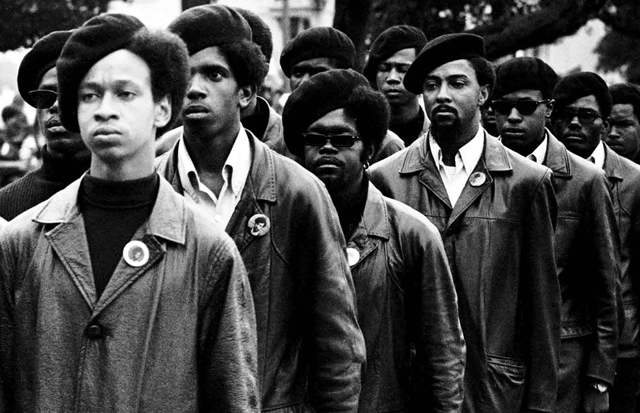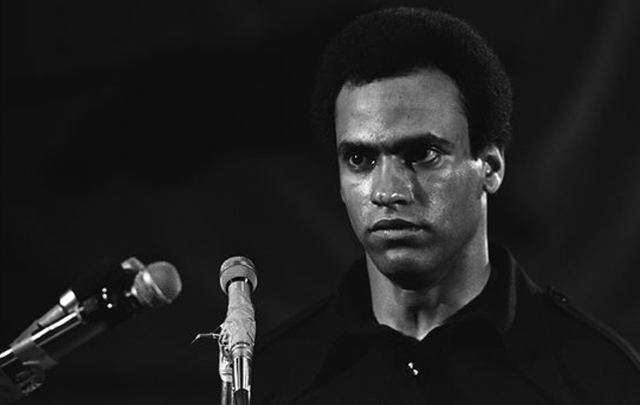CHICAGO – Patrick McDonald of HollywoodChicago.com audio review for the doc series “Charlie Hustle & the Matter of Pete Rose,” about the rise and bitter fall of the major league legend, the MLB’s all-time hits leader, only to be banned from the sport because of gambling. Streaming on MAX and on HBO since July 24th.
Important History in ‘The Black Panthers: Vanguard of a Revolution’
 Rating: 4.5/5.0 |
CHICAGO – If you want to experience the old cliché of “everything old is new again,” look no further than the excellent documentary, “The Black Panthers: Vanguard of a Revolution.” The formation of the famous 1960s political group is rooted in the same issues that came out of Ferguson and Baltimore – the marginalization and harassment of African Americans by law enforcement authority. Yes, the group’s techniques were questionable, but so was the use of tax payer money – through the FBI – to destroy the organization.
The Black Panthers were formed in 1966 out of Oakland, California, anchored by notable activists Huey Newton and Bobby Seale. With police harassment against African Americans reaching another crescendo during the mid-1960s, the Panthers reacted with revolutionary confrontation techniques. These strategies struck a chord in highest levels of federal law enforcement, and the FBI began a sting operation to destroy the group from within. The documentary creates the history in chronological order, from the first ideals of the group in its formation, to its rapid growth, through the government infiltration and acts of violence, and finally to the splintering and destruction of the movement. This is vital history, not just because everything-old-is-new-again, but because of the blatant waste of law enforcement resources to squelch the Panther’s brand of dissent, basically because of the government’s own fear.
The film opens with an interesting metaphor – the old fable of blind men considering an elephant, and describing it differently based on the part of the animal they touched. Thus was The Black Panther Movement – a organization that had many goals, and meant different things to whoever happened to be involved with it. The Black Panthers emerged from the fledgling Black Power philosophy of the mid-1960s, fomented by a radical approach opposite to Dr. Martin King Jr. and the civil rights movement.

Black Panther Rally in Oakland, July of 1968, in ‘The Black Panthers: Vanguard of a Revolution’
Photo credit: Photo Courtesy of Stephen Shames for Firelight Films
The original Oakland Black Panthers – which included Bobby Seale and Huey Newton – sought to crush police oppression by practicing the “open carry” gun laws in California at the time. This exploded into a confrontation with the state legislature – who was perfectly willing to practice gun control when it involved African Americans – which helped to expand the movement throughout the country. What followed were years of local and federal police harassment, outright political murder and a division of philosophy from within.
The story is eye-opening, cautionary and contemporary – we’re experiencing the marginalization of the Black Lives Matter movement right now – but also exposes the problems that occur when an organization’s philosophy becomes scattered in many directions. As one of the ex-Panthers noted, the Panthers were successful because of their “ideals, youthful vigor and enthusiasm,” but were also able to be infiltrated and destroyed by the FBI because of the same reason. Again, the power that makes something great, also can destroy it.
What raises the blood pressure in the documentary is the incredible use of law enforcement to essentially denounce any black organization as threatening. The force of arrest for trumped up or weak charges is a weapon that is freely used back then (and today). FBI Director J. Edgar Hoover also made the squelching of any black dissent a priority, focusing on leadership like the Oakland founders and later on the literary activist Eldridge Cleaver. And once Dr. King was assassinated, Black Panthers like Huey Newton and Fred Hampton (Chicago) were targeted either by incarceration or murder.
The human being element is on display as well, with the destructive emotions of anger, fear, racism, sexism and cowardice helping to destroy the Panthers from both outside and inside the organization. Newton, who was the subject of an intense campaign to free him from jail, came out a changed man. His mental state was destroyed and he took the people of the organization down with him. Hoover planted his own infiltrators inside the movement, and relished the split of Panther factions between Newton and Eldridge Cleaver. With all this happening, it was almost impossible for the Black Panthers to survive, and they finally dissolved around the mid-1970s.

Huey Newton in ‘The Black Panthers: Vanguard of a Revolution’
Photo credit: Photo Courtesy of Stephen Shames for Firelight Films
Featured in the documentary, the survivors of the era are philosophical. They had there own reactions to the enthusiasm of the group dynamic, and the negativity that brought it down. There is a remarkable memory of one Panther member during a shoot out after a raid, as he held off the Los Angeles police department. It was a feeling of pure freedom, as the factors against them were on the outside, and he was king of his territory on the inside. When you ain’t got nothing, you’ve got nothing to lose.
Only Bobby Seale is still alive from the original big three leaders of the Black Panthers, Newton and Cleaver are both gone. Seale served as an educator, and still works within the system to change it. The film also reminds us that 20 Black Panthers are still serving time in jail – marginalized and controlled by a law enforcement system that was, and is still, afraid of some serious people power.
 | By PATRICK McDONALD |


